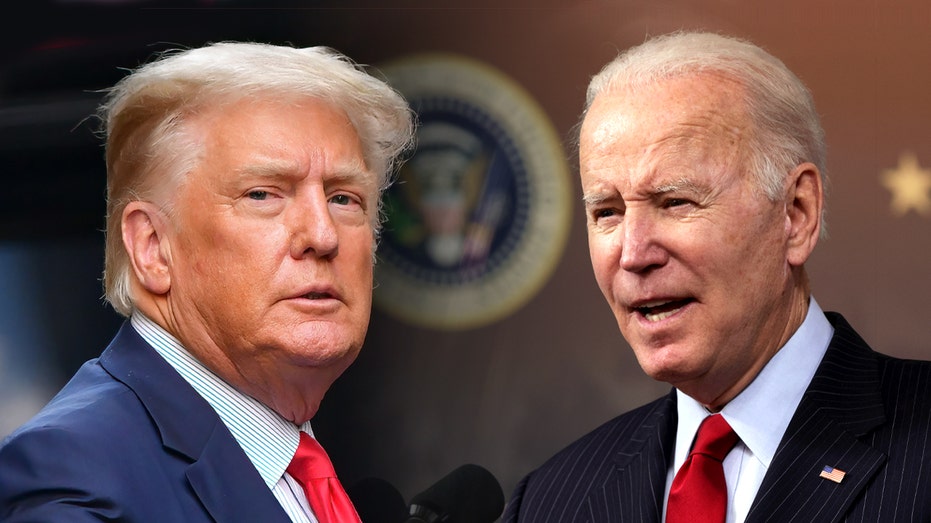House Republicans bash Senate's Trump agenda blueprint: 'This is offensive'
The Senate GOP budget plan designed to usher President Trump’s sweeping domestic priorities into law is getting an ice-cold reception from Republicans in the House, where conservatives are balking at the low levels of mandated spending cuts and the heightened deficits that could result. But after Trump’s endorsement of the plan, House Republicans face enormous...

The Senate GOP budget plan designed to usher President Trump’s sweeping domestic priorities into law is getting an ice-cold reception from Republicans in the House, where conservatives are balking at the low levels of mandated spending cuts and the heightened deficits that could result.
But after Trump’s endorsement of the plan, House Republicans face enormous pressure to give the president a victory on his top campaign promises, including an extension of tax cuts, new limits on immigration and a boost in domestic energy production. That pressure will likely grow in the face of the fallout from Trump’s new tariffs, which sent markets plummeting on Thursday and threatened a global recession.
The budget debate is just the latest challenge for Speaker Mike Johnson (R-La.) and his leadership team, who are already struggling to resolve an internal battle over proxy voting for new parents — one that’s shut down floor activity indefinitely — and will soon confront the dilemma of how to approach the Senate budget blueprint in the face of the uproar within their House GOP conference.
If the early response is any indication, they have their work cut out.
"THE SENATE VERSION IS DEAD ON ARRIVAL," Rep. Ralph Norman (R-S.C.), a member of the hardline conservative House Freedom Caucus, wrote in a text message, "among many of our Freedom Caucus members as well as other conservatives who are concerned about the lack of cuts in the Senate bill."
"What they sent back was not a serious counter to our House version," he added.
“The Senate budget bill is really offensive; quite frankly, it’s a joke,” Rep. Andy Ogles (R-Tenn.) said Thursday. “[T]his is offensive and so I’m a hard no on this junk.”
Conservatives like Ogles are up in arms specifically over the Senate’s proposal requiring upper-chamber committees to locate at least $4 billion in specific cuts to federal spending — a microscopic fraction of the $1.5 trillion minimum in cuts mandated under the budget blueprint adopted by the House in February.
“Look, $1.5 trillion, that was a serious offer from the House of Representatives,” Ogles said. “A $3 to $4 billion cut is offensive to the American people, it’s a joke, it should not have been presented.”
In an effort to address those concerns, Senate Republicans included two tiers of instructions in their compromise plan, mandating at least $4 billion in cuts for Senate committees and a minimum of $1.5 trillion for those in the House. Senate Republicans also maintain that the $4 billion is just a starting point designed to grant committees maximum flexibility in locating cuts, and the number will rise dramatically in the weeks to come.
House conservatives, however, don’t believe it. Earlier this week, amid reports of the compromise budget resolution including two different sets of instructions, Norman said he would not back a measure with those details.
“It’s got to be the $2 trillion,” Norman said, referring to the target for spending cuts included in the House’s budget resolution. “We have to be in lockstep with that.”
Another hardline conservative, who asked for anonymity to discuss a sensitive dispute, accused the Senate of trying to jam the House with a package that would do little to rein in deficit spending, expressing doubt that the lower chamber’s instructions would reign supreme.
“Different instructions is code for: ‘We’re the Senate and our instructions will win out,’” the lawmaker said on Thursday.
Even House Budget Committee Chairman Jodey Arrington (R-Texas) is backing up his hardline conservative colleagues, airing concerns that those on the right-flank will not get on board with the blueprint.
“I can’t imagine any world where deficit hawks in the House would ever walk away from the reconciliation process with the deficit going up at the rate it would with that framework,” Arrington said Wednesday, according to Politico. “I would have tremendous concern.”
Another gripe from the conservatives relates to the Senate’s plan to abandon normal budget rules and adopt an accounting gimmick that puts the cost of extending Trump’s 2017 tax cuts at $0 — a far cry from the roughly $4 trillion the Congressional Budget Office has estimated. That might help with the scoring, the critics say, but it will only exacerbate the nation’s $36 trillion debt.
“Adopting a policy baseline does not change basic math,” Rep. Chip Roy (R-Texas) said Thursday. “And the Senate is not indicating it can do that math.”
The blowback highlights the difficulties facing GOP leaders in both chambers as they race to adopt Trump’s domestic agenda in the coming months. The Republicans are expected to move the legislation on an obscure procedural track, known as reconciliation, which prevents the minority Democrats from blocking the package with a filibuster in the upper chamber.
But uniting the various factions of the GOP conference poses its own unique difficulties — a challenge only exacerbated by the Republicans’ hairline majority in the House, where just a few defections would sink the whole project. With Democrats poised to oppose the measure unanimously, the Speaker can afford to lose only three of his own members on the vote, assuming full attendance.
If the conservative demands for sharper cuts were the only factor, the fix might be easy. But more moderate Republicans — many of them facing tough reelections in battleground districts — have their own red lines. And a number of those lawmakers are wary that slashing trillions of dollars in spending would necessarily gut federal programs that benefit their constituents, including Medicaid, which is likely facing sharp cuts under the House budget plan.
Some of those centrist are already advocating for the smaller cuts championed by the Senate.
“The end bill will be more like the Senate’s numbers,” Rep. Don Bacon (R-Neb.), who represents a district Kamala Harris won in 2024, told The Hill. “There’s about 20 of us who are public that we won’t support Medicaid cuts that hurt patients or hospitals.”
Rep. David Valadao (R-Calif.), another centrist Republican, sounded a similar note, pointing to the difficult dynamics leadership is facing as they try to appease both ends of the ideologically diverse GOP conference.
“I think ultimately the Senate’s gonna win out,” he told The Hill. “The numbers are probably more aligned with where most members are. But it is going to be a complicated flight.”
“On the far-right, they’re not gonna be happy, and on the moderate side, they’re not gonna be happy,” he added. “So it’s gonna be painful for everyone.”
The sensitive balancing act is set to come to a head next week, when Johnson plans to bring the budget resolution to the floor — as long as the Senate can advance it this weekend.
“The Senate moves on the resolution today, and we’ll be moving it through the House next week and that is, you know, the starting gun for the big game,” Johnson said Wednesday. “It’s the kickoff of the game to get the budget reconciliation bill done.”
Trump is likely to be a wildcard in the debate — one that GOP leaders are hoping can unite the fractious conference. In February, the president did just that when House Republicans passed their budget resolution even after some lawmakers expressed concerns. And Trump did it again last month when he rallied House Republicans behind a government spending bill — a topic that has historically split the conference.
He quickly jumped into the budget debate this week, endorsing the Senate legislation shortly after it was unveiled.
“The Senate Budget plan gives us the tools that we need to get our shared priorities done, including certain PERMANENT Tax Cuts, Spending Cuts, Energy, Historic Investments in Defense, Border, and much more,” Trump wrote on Truth Social, the media platform he owns.
“Every Republican, House and Senate, must UNIFY. We need to pass it IMMEDIATELY!”
Lending Johnson a boost, Florida voters on Tuesday sent two Republicans to the House, filling empty seats vacated by GOP lawmakers following November’s elections. The development gives GOP leaders a slightly larger cushion, and the Speaker said he was “elated” after swearing in the new pair on Wednesday.
“The margin is a little more comfortable,” he added. “It’s an embarrassment of riches now. We can move, what, three votes now, or something. We’re gonna build consensus around this, we’re excited.”










































































